Eight-Day Firemen's Strike Begins
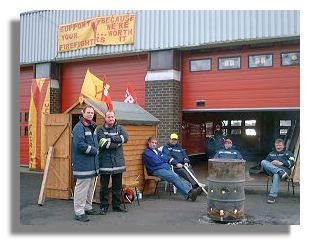 Despite last minute negotiations, which went on into the small hours of the morning, the Fire Brigade Union has rejected a 16% pay increase and began an 8-day strike on Friday. At one stage, it looked as though agreement had been reached. But the government turned down 11th-hour proposals which they say could not be financed. A recent review of firemen's pay and conditions had recommended a 4% increase and a further 12% rise which would be linked to "productivity savings". The firemen are reluctant to accept the efficiency savings, partly because these are vague, partly because they fear that it would lead to a reduction in the number of fire-fighters. And many firemen use the present shift patterns to augment their pay with second jobs which they might have to give up if their hours of work are extended. The government is also in a difficult position. Any further increases not linked to productivity gains, would inevitably lead to wage demands from other public service workers. But there is a lot of public support for the firemen, whose basic wage is only around £21,000 a year. The armed forces are now providing basic fire-fighting cover, but these are inevitably inferior to the professional fire service. And as the possibility of involvement in an armed conflict with Iraq increases, the manpower in the armed forces is being over-stretched.
Despite last minute negotiations, which went on into the small hours of the morning, the Fire Brigade Union has rejected a 16% pay increase and began an 8-day strike on Friday. At one stage, it looked as though agreement had been reached. But the government turned down 11th-hour proposals which they say could not be financed. A recent review of firemen's pay and conditions had recommended a 4% increase and a further 12% rise which would be linked to "productivity savings". The firemen are reluctant to accept the efficiency savings, partly because these are vague, partly because they fear that it would lead to a reduction in the number of fire-fighters. And many firemen use the present shift patterns to augment their pay with second jobs which they might have to give up if their hours of work are extended. The government is also in a difficult position. Any further increases not linked to productivity gains, would inevitably lead to wage demands from other public service workers. But there is a lot of public support for the firemen, whose basic wage is only around £21,000 a year. The armed forces are now providing basic fire-fighting cover, but these are inevitably inferior to the professional fire service. And as the possibility of involvement in an armed conflict with Iraq increases, the manpower in the armed forces is being over-stretched.
Parliament Building Delayed - Again

It has been confirmed that there has been a further delay in the timetable for completion of the new Scottish parliament building being constructed at Holyrood in Edinburgh. The Scottish Members of Parliament will not now be able to move into the huge new building when Parliament starts its first session after the summer recess in September next year. The opening may have to be delayed until 2004. Costs are also continuing to rise - the latest estimate is £307 million. The management team for the project are currently trying to resolve how to make the building more bomb proof in the light of the international terrorism threat. First Minister Jack McConnell, celebrating this week his first year in office, was forced to admit that the spiralling costs and delays in the construction of the new Scottish parliament building has created a lot of disillusionment amongst the public and had been the greatest disappointment of devolution. But only people who have participated in major building projects know how difficult it is to meet initial timetables. And this development has also had to cope with the bickering and delays of politicians plus the deaths of both the building's principal architect and of the Scottish First Minister, Donald Dewar.
Hundreds Homeless After Floods
The north-east of Scotland was once again affected by flooding after torrential rain (three inches in less than 48 hours) caused the river Lossie at Elgin to burst its banks. 300 people were forced to evacuate their homes - some families had a similar experience five years ago when floods hit the area. But the present floods are said to be the worst for 180 years. Many roads were closed by the water - Elgin was almost cut off, with only one road into the town passable. There were calls for the government to release more finance for flood prevention schemes for the area more quickly. The current timetable is for a flood prevention scheme for Elgin to get underway in the spring of 2004. The 1997 floods cost the local economy in Moray between £50 million and £100 million and this time the water was two feet higher.
Later in the week, further torrential rain and gales in the north-east caused more chaos with more road closures and ferry services cancelled. A lifeboat had to be used to evacuate people from their homes in Angus at Bridge of Dun and 20 people were forced to leave their homes in Brechin when the river Esk burst its banks. Aberdeen Harbour was closed for a time but Moray, which had been hit by devastating floods during the previous weekend, escaped the worst of the weather this time.
Bairns Cause a Stooshie at Holyrood
 In response to a visit to the debating chamber of the Scottish Parliament by a party of primary school children who are involved in a project to promote the Scots language, the Members of the Scottish Parliament were encouraged to take up the challenge of using Scots words - which created quite a stooshie (uproar) and a bit of a stramash (disorderly uproar). The First Minister and the leader of the opposition had the opportunity to girn (grumble) and haver (talk nonsense) of course. Individual MSPs have "adopted" individual words to use on a regular basis, including clamjamfrie (a rabble or a disorderly group of people) and pauchle (small amount). The children are compiling their own dictionary of Scots words to be called "A Word from the Weans" (weans is the Scots word for young children).
In response to a visit to the debating chamber of the Scottish Parliament by a party of primary school children who are involved in a project to promote the Scots language, the Members of the Scottish Parliament were encouraged to take up the challenge of using Scots words - which created quite a stooshie (uproar) and a bit of a stramash (disorderly uproar). The First Minister and the leader of the opposition had the opportunity to girn (grumble) and haver (talk nonsense) of course. Individual MSPs have "adopted" individual words to use on a regular basis, including clamjamfrie (a rabble or a disorderly group of people) and pauchle (small amount). The children are compiling their own dictionary of Scots words to be called "A Word from the Weans" (weans is the Scots word for young children).
£400,000 Opening Party "A Waste of Money"
As the further delays in the completion and the escalating costs of the new Scottish Parliament building were being acknowledged, it has emerged that £400,000 of public money will be spent in an opening ceremony - whenever that might be. While critics say that it is a waste of public money, the event will be more low-key than that which marked the start of devolution in 1999. It is expected that the new building will become a major tourist attraction for both Scots and visitors from abroad, as well as the home of the legislature.
Huge Curbs on Scottish Fishing Fleet
 Scottish fishermen were faced this week with alternative proposals from officials of the European Fisheries Commission to allow the white fish stocks in the North Sea and in Scottish waters to recover. But the stark choice was between complete closure or unprecedented curbs on fishing in the area. These would result in trawlers being tied up at the quayside for 80% of the year and draconian catching limits. Either option would be disastrous for both the fishermen and the fish processing industry on land. While the officials say that the measures are designed to allow fish stocks to recover, fishermen say that there will be no fishing industry left if the cuts go ahead. But if they continue to fish at present levels, there will be no fish left to catch.
Scottish fishermen were faced this week with alternative proposals from officials of the European Fisheries Commission to allow the white fish stocks in the North Sea and in Scottish waters to recover. But the stark choice was between complete closure or unprecedented curbs on fishing in the area. These would result in trawlers being tied up at the quayside for 80% of the year and draconian catching limits. Either option would be disastrous for both the fishermen and the fish processing industry on land. While the officials say that the measures are designed to allow fish stocks to recover, fishermen say that there will be no fishing industry left if the cuts go ahead. But if they continue to fish at present levels, there will be no fish left to catch.
Prawns Instead of Cod
While the final details of the major cut-backs in the fishing industry are still being thrashed out in Brussels by the European Commission, marine scientists are offering a glimmer of hope of an alternative catch for the beleaguered fishermen. As a result of the disastrous decline in the number of cod in Scottish waters, there has been an explosion in the number of prawns reaching maturity. Cod are a major predator of prawn spawn and the reduced numbers of the white fish has given them a better opportunity to survive. Fishing for prawns has grown from almost nothing 40 years ago to catches with a current value which is already twice that of cod.
Glasgow Gets Switched On
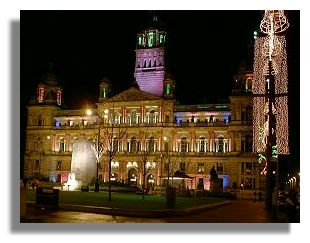 The Christmas lights in Glasgow's George Square were switched on last Sunday, bringing bright lights and jollity to the dark winter days. The 45ft tall spruce tree, an annual gift from the people of Norway, has brightly-coloured boxes arranged underneath and the City Chambers, the home of Glasgow City Council, is covered in fairy lights. Those of you who drop into the George Square Webcam from time to time, will see work going ahead to construct the ice rink, merry-go-rounds and Ferris wheel in the square. In order to allow the skating to be extended, the rink will be covered over for Hogmanay.
The Christmas lights in Glasgow's George Square were switched on last Sunday, bringing bright lights and jollity to the dark winter days. The 45ft tall spruce tree, an annual gift from the people of Norway, has brightly-coloured boxes arranged underneath and the City Chambers, the home of Glasgow City Council, is covered in fairy lights. Those of you who drop into the George Square Webcam from time to time, will see work going ahead to construct the ice rink, merry-go-rounds and Ferris wheel in the square. In order to allow the skating to be extended, the rink will be covered over for Hogmanay.
225 Jobs Axed at Oil Terminal
The giant oil company BP has announced that it is reducing its 300-strong work force by a quarter and axing half of its 300 sub-contractors at its oil terminal at Sullom Voe in Shetland. It will leave less than half of the number employed at the terminal's peak in the 1980s. Oil has been a major source of revenue for the Shetland Isles in the far north of Scotland and the cut-backs are likely to have a knock-on effect in the local economy. The company says that streamlining the operation and making it more efficient will allow it to extend its life beyond 2015. Shetland currently has an unemployment rate of only 1.5%.
Takeover of Clydeport by Manchester-based Company
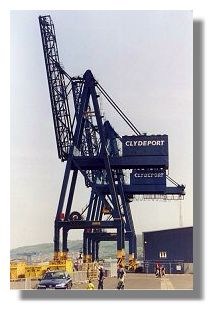 A development company based in Manchester in England has launched a takeover bid for Clydeport, the driving force behind the £500 million, 120-acre Glasgow Harbour project on the Clyde riverfront. The Peel Holdings empire spans shopping malls to the Manchester ship canal and Liverpool's John Lennon Airport. The directors of Clydeport are recommending the deal, amid assurances that the developments along the Clyde were not only safe but might be improved by the expertise and greater financial muscle of Peel Holdings. Both directors and staff in Clydeport will have a large windfall from the takeover of the company's shares. Clydeport's current chief executive will be put in charge of the port operations at the river Clyde and at Manchester Ship Canal. Part of his job will be to boost freight operations between the two locations.
A development company based in Manchester in England has launched a takeover bid for Clydeport, the driving force behind the £500 million, 120-acre Glasgow Harbour project on the Clyde riverfront. The Peel Holdings empire spans shopping malls to the Manchester ship canal and Liverpool's John Lennon Airport. The directors of Clydeport are recommending the deal, amid assurances that the developments along the Clyde were not only safe but might be improved by the expertise and greater financial muscle of Peel Holdings. Both directors and staff in Clydeport will have a large windfall from the takeover of the company's shares. Clydeport's current chief executive will be put in charge of the port operations at the river Clyde and at Manchester Ship Canal. Part of his job will be to boost freight operations between the two locations.
Tobacco Advertising Ban Next Year
The organisation ASH (Action on Smoking and Health) breathed a sigh of relief this week when it was announced that the long-awaited ban on tobacco advertising will be implemented in Scotland from 14 February next year. The restrictions will apply to newspapers, billboards, leaflets and promotional material. While there is some disagreement about the extent to which advertising encourages people to take up smoking, it is hoped that it will help to reduce the 13,000 deaths and 35,000 hospital admissions linked to smoking each year.
ScotRail Punctuality Slumps
 The bad weather in October resulted in a number of rail links being flooded and affected by landslips. These had a detrimental effect on ScotRail's already dismal punctuality record during the month, with figures falling to the worst level for over a year. In Central Scotland, only 73.4% of services arrived within ten minutes of the scheduled time. The flagship route between Edinburgh and Glasgow saw 18% of trains running late while 32% of trains on the overnight sleeper service between Scotland and London arrived over 30 minutes late. One "overnight" sleeper arrived at 2.30pm the following afternoon.
The bad weather in October resulted in a number of rail links being flooded and affected by landslips. These had a detrimental effect on ScotRail's already dismal punctuality record during the month, with figures falling to the worst level for over a year. In Central Scotland, only 73.4% of services arrived within ten minutes of the scheduled time. The flagship route between Edinburgh and Glasgow saw 18% of trains running late while 32% of trains on the overnight sleeper service between Scotland and London arrived over 30 minutes late. One "overnight" sleeper arrived at 2.30pm the following afternoon.
Dual Carriageway on Perth to Inverness Road Rejected
Appeals to have the main A9 road between Perth and Inverness upgraded to dual carriageway standard (two lanes in each direction with a central reservation) have been rejected by the Transport Minister. Although the road is notorious for road accidents often by cars attempting to overtake and meeting on-coming traffic, the minister says that the level of traffic on the road does not warrant the expenditure to have it improved along its entire length. But the Scottish Executive says is committed to identifying those places on the A9 where investment would improve road safety. The minister pointed out that the accident rate on the A9 was very close to the average for similar trunk roads.
£6.8 Million to Improve Dundee's Public Transport
 The Scottish Executive (government) has announced that it is to allocate an additional £6.8 million to make public transport in Dundee quicker and more convenient. Around 550 "quality" bus stops are to be created with electronic displays to show constantly updated waiting times. And buses will be fitted with electronic devices to control traffic lights so that they change more quickly to green when they approach. The cash is coming from a £59 million funding package for 23 local public transport projects across Scotland. The latest finance brings Dundee's total benefit from the scheme to £12 million. Dundee does not have the congestion which is often experienced in cities such as Edinburgh, Glasgow and Aberdeen but nevertheless the government is trying to encourage fewer car journeys and greater use of public transport everywhere.
The Scottish Executive (government) has announced that it is to allocate an additional £6.8 million to make public transport in Dundee quicker and more convenient. Around 550 "quality" bus stops are to be created with electronic displays to show constantly updated waiting times. And buses will be fitted with electronic devices to control traffic lights so that they change more quickly to green when they approach. The cash is coming from a £59 million funding package for 23 local public transport projects across Scotland. The latest finance brings Dundee's total benefit from the scheme to £12 million. Dundee does not have the congestion which is often experienced in cities such as Edinburgh, Glasgow and Aberdeen but nevertheless the government is trying to encourage fewer car journeys and greater use of public transport everywhere.
Air-Scotland Takes Off
Yet another low-cost airline is to start services from Prestwick Airport in Ayrshire. Operator Air-Scotland plans to run cheap flights direct to Spanish sunspots The company is based in Glasgow and is the second Scottish company to try to catch up with the low-cost revolution in air travel. Irish airline Ryanair is now a major user of Prestwick and Globespan (an Edinburgh-based company) and Buzz have also announced they will be starting services from Prestwick. However, Air Scotland will have to see off a legal challenge from an English company which registered the business name last year.
£6 Million to Lure Airlines to Scotland
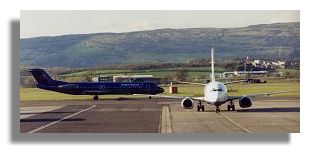 Although there has been a welcome increase in the number of budget airlines coming to Scottish airports, there have been a number of occasions when Scotland has lost out on additional services because of landing charges being too high for the low margin operators - fees at Glasgow are higher than at London's Heathrow Airport. After considerable lobbying, the Scottish Executive has announced a £6 million "Route Development Fund" to subsidise airlines expanding their networks in Scotland.
Although there has been a welcome increase in the number of budget airlines coming to Scottish airports, there have been a number of occasions when Scotland has lost out on additional services because of landing charges being too high for the low margin operators - fees at Glasgow are higher than at London's Heathrow Airport. After considerable lobbying, the Scottish Executive has announced a £6 million "Route Development Fund" to subsidise airlines expanding their networks in Scotland.
Largest Windfarm Opens
Scotland's largest wind farm, at Bowbeat Hill near Peebles, was officially opened this week by the UK energy minister. It has 24 turbines, each 75 metres (250 feet) high and is capable of producing enough electricity to provide the annual power requirements of 22,500 households - or half the homes in the Scottish Borders.
World's First Bus Powered By Wind
The whisky-producing island of Islay is to run the world's first bus powered by wave-generated electricity by the end of November. Greenpeace, the environmental campaigning group, has donated the electric bus which will be powered from a commercial wave generator on Islay. They are confident that this is the first wave-powered bus in the world. Previously, electric vehicles have mostly relied on fossil-fuel power generation.
"Flight Simulators" For Bus Drivers
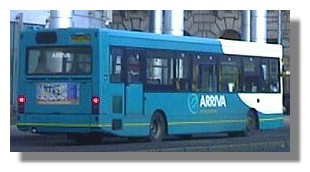 Coach firm Arriva, which operates in the west of Scotland, is introducing a new scheme to train drivers which involves them using a revolutionary 3D simulator, similar to that used by airline pilots. It will give trainees the "ultimate driving experience" without leaving the classroom. It is thought that this is the first time that the technology has ben adapted for use by bus drivers.
Coach firm Arriva, which operates in the west of Scotland, is introducing a new scheme to train drivers which involves them using a revolutionary 3D simulator, similar to that used by airline pilots. It will give trainees the "ultimate driving experience" without leaving the classroom. It is thought that this is the first time that the technology has ben adapted for use by bus drivers.
Last of the Leonids
Amateur astronomers in Scotland are often thwarted in attempts to see the annual display of Leonid meteors each November - cloudy skies often obscure the view of the hundreds and sometimes thousands of dust particles creating "shooting stars" as the Earth passes through the tail of an old comet. But this year a number of areas had more or less clear skies and although for most people street lighting obscured all but the brightest, there was nevertheless a great display in the west of Scotland - for those still around at 3am and 4am! Astronomers predict that this may be the last time this century that Earth will pass through the dust cloud left by comet Tempel-Tuttle.
New Bid for Water Treatment Works
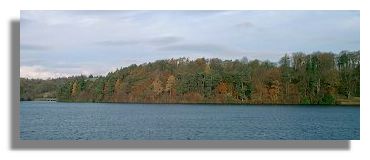
When East Dunbartonshire Council rejected a planning application by Scottish Water to build a water treatment plant at Mugdock in Milngavie to provide a safer water supply to Glasgow, there was fury from the city's media. Residents in Milngavie, who had mounted a vociferous campaign to have the development turned down, were accused of endangering the lives of Glaswegians by not allowing the filtration plant to be built. Local councillors who had voted against the proposal were accused of NIMBY (not in my back yard). But now Scottish Water has lodged a revised set of plans which they say meet many of the objections. The main building has been reduced in size and the roof lowered, to make it less visible as far as those walking round the reservoir are concerned. And the disinfection process will be amended to remove the need to store chlorine gas at the site. Those who objected now say that they were right as it has produced these improved proposals.
French Whisky Firm Comes to Scotland
The fourth largest spirits firm in France is setting up a blending, distribution and storage complex at Livingston in West Lothian in a £15 million custom-built factory. It will create 250 new jobs in an area which is an unemployment black spot following the loss of 3,000 jobs last year when Motorola closed its factory there. Having a Scottish base will allow the company's products (a single malt called Glen Turner and a blended whisky, Label Five) to have "Made in Scotland" stamped on its bottles.
Otters Return to Urban Scotland
 A survey by the Wildlife Trusts has shown that for the first time for 30 years otters can now be regularly found in large town and city waterways including Edinburgh, Glasgow, Perth and Aberdeen. The move into urban areas reflects the general improvement in water quality and the resultant increase in available food for the shy animals. Scotland has managed to keep a good population of otters, even in the more heavily populated Central belt. But building works along rivers and waterways rarely make allowance for the creatures and the Wildlife Trusts have called for local planning authorities to take account of the needs of otters when developments take place.
A survey by the Wildlife Trusts has shown that for the first time for 30 years otters can now be regularly found in large town and city waterways including Edinburgh, Glasgow, Perth and Aberdeen. The move into urban areas reflects the general improvement in water quality and the resultant increase in available food for the shy animals. Scotland has managed to keep a good population of otters, even in the more heavily populated Central belt. But building works along rivers and waterways rarely make allowance for the creatures and the Wildlife Trusts have called for local planning authorities to take account of the needs of otters when developments take place.
Prince Avoids Raisin Weekend
Prince William, in his second year at St Andrews University, was noticeably absent again from the traditional frolics of new students in "Raisin Weekend". The new entrants traditionally offer a gift (usually a bottle of wine these days) to their "academic fathers and mothers". The event then usually degenerates into a pitched battle amongst the students. In days gone by, the throwing of eggs and flour and anything else which came to hand led to objections from local traders and residents. So nowadays the most common "weapons" are cans of shaving foam which at least washes off more easily from clothes, streets and buildings.
High Flying Grouse Opens Cellar
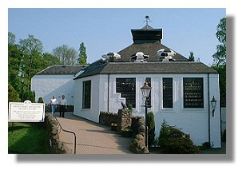 The Famous Grouse Experience at Glenturret Distillery near Crieff in Perthshire is opening the doors of its 230-year-old basement to the public for the first time as part of a pre-Christmas extravaganza this weekend. Visitors will find a wide selection of whisky and enjoy the atmosphere of what was once a smugglers' den. The event also marks the launch of the 1972 Glenturret Limited Edition, a cask strength whisky retailing at £140 a bottle. Each is individually numbered and signed by both the distillery manager and the stillman. Other brands in the Edrington holding company stable will also be available, including The Macallan and Highland Park.
The Famous Grouse Experience at Glenturret Distillery near Crieff in Perthshire is opening the doors of its 230-year-old basement to the public for the first time as part of a pre-Christmas extravaganza this weekend. Visitors will find a wide selection of whisky and enjoy the atmosphere of what was once a smugglers' den. The event also marks the launch of the 1972 Glenturret Limited Edition, a cask strength whisky retailing at £140 a bottle. Each is individually numbered and signed by both the distillery manager and the stillman. Other brands in the Edrington holding company stable will also be available, including The Macallan and Highland Park.
Mercedes Goes Better on Coca-Cola
Recently, a Sutherland car owner had reason to remember the old advertising slogans "Things go better with Coke" and "Coke adds life". Ronnie McNeill was trying to deal with a 1964 Mercedes (they like to make things last up there) which had an engine which had seized up. He had tried various solutions and then remembered how he had used Coca-Cola to clean up pennies when he was a child - the acid in the Coke made dirty coins bright and shiny. So he bought a litre bottle of Coke and poured it into the sparkplug holes and left it for 24 hours. He got a big shock when the car started, first time. If it hadn't worked, he would have been faced with stripping the engine down. Ronnie runs a taxi firm and bought the Mercedes 220 Fintail and used it regularly until 1981. He is trying to restore the car to pristine condition and hire it out for weddings and special occasions.
Fighters Scrambled in Alert
 It has emerged that two Tornado fighter jets were scrambled from the RAF base at Leuchars in Fife earlier this month when a helicopter flew into an air exclusion zone around the nuclear submarine base at Faslane on the Gare Loch and then disappeared from the radar screens. It later emerged that the helicopter had been carrying a TV camera crew who were trying to film the nuclear submarine HMS Trafalgar which had been limping back to base after running aground on a rock off Skye.
It has emerged that two Tornado fighter jets were scrambled from the RAF base at Leuchars in Fife earlier this month when a helicopter flew into an air exclusion zone around the nuclear submarine base at Faslane on the Gare Loch and then disappeared from the radar screens. It later emerged that the helicopter had been carrying a TV camera crew who were trying to film the nuclear submarine HMS Trafalgar which had been limping back to base after running aground on a rock off Skye.
"Don't Invest in Scottish Ski Resorts"
An expert in global warming has warned investors not to put money into Scottish ski resorts and predicts that the present multi-million-pound industry could be wiped out later this century. On average, 400,000 skiers take to the Scottish slopes annually, in a season which normally stretches from December to the end of April. But in a year in which the Scottish ski resorts opened early following a heavy snowfall (which has now melted), the scientists are talking about decades before the winter snow disappears forever. So Snow Sport Scotland, which develops skiing and snowboarding in Scotland says that it is "not concerned." Of course, there may be an upside to climate change and warmer weather - 2050 may be a good year for Scottish wine. Currently, grapes are only grown in small quantities under glass.
Top Hotels for Hospitality
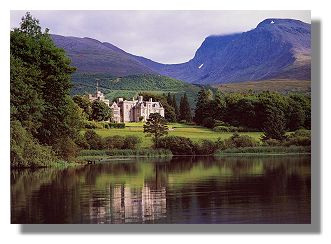
Inverlochy Castle Hotel at Fort William has been named as one of the UK's best luxury hotels in a list produced this week by the Automobile Association. The hotel, built in 1863, was a private residence until 1969 when it was converted into a top-class hotel. In the 19th century, Queen Victoria stayed there with her gillie, John Brown, and wrote in her diary "I never saw a lovelier or more romantic spot." See this feature article for a review of this hotel.
Weather in Scotland in October
The detailed revue of weather statistics for the month of October has now been published by the Scottish Meteorological Office. It shows that some eastern areas had over three times the normal rainfall in the month and in some places rainfall records were broken. Only in the far west, in locations such as Skye, was the rainfall below average. Sunshine was in short supply, particularly in the east and west of Scotland. Only Orkney and Shetland had above the usual amount of direct sun for October. Unusually, temperatures were below the long-term average, the centre of the country being as much as 1.5 degrees Centigrade below normal.The highest temperature in the month was 22.4C (72F) in Peebles in the Scottish Borders on the 1st of the month. The lowest temperature was -8.6C (16.5F) overnight at Carnwath in South Lanarkshire on the 20th. Nunraw in East Lothian recorded 83.9mm (3.3 inches) of rain in the 24 hours on 21st October.
Weather in Scotland This Week
 As noted earlier in this Newsletter, there have been spells of very heavy rain this week, especially in the north-east of the country. Moray was particularly badly affected on Sunday and Aberdeenshire and Angus were subjected to gales and torrential rain in the middle of the week. Sunshine was in short supply with nearly every major weather station in Scotland seeing no clear skies on Wednesday and Thursday. Lerwick, in Shetland, however, had five to six hours of sunshine on both Sunday and Monday.
As noted earlier in this Newsletter, there have been spells of very heavy rain this week, especially in the north-east of the country. Moray was particularly badly affected on Sunday and Aberdeenshire and Angus were subjected to gales and torrential rain in the middle of the week. Sunshine was in short supply with nearly every major weather station in Scotland seeing no clear skies on Wednesday and Thursday. Lerwick, in Shetland, however, had five to six hours of sunshine on both Sunday and Monday.
While most of the deciduous trees in Scotland have lost nearly all their leaves, this sycamore in a sheltered spot in suburban Glasgow still had a good covering of bright yellow leaves this week.
|


The Scottish Snippets Newsletter in its original format began in April 1997 and continued in an unbroken series for 591 issues. Although no longer produced in that format there is now a regular update on the new and updated pages on the Rampant Scotland site and also "Scottie's Diary" on an intermittent basis, To receive this, kust send an e-mail to Scottie with "Subscribe Newsletter" in the subject line.
 Historical Affairs - Topical Items from Scotland's Past
Historical Affairs - Topical Items from Scotland's Past


